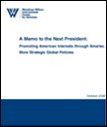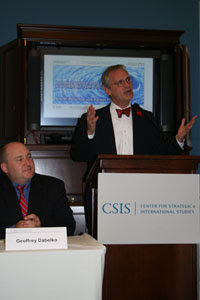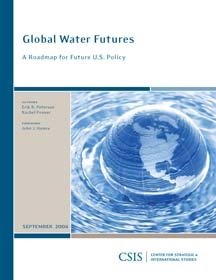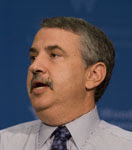-
Natural Gas Standoff Between Russia, Ukraine Brings New Meaning to “Cold War”
›January 15, 2009 // By Rachel WeisshaarAs the dispute between Russia and Ukraine over natural gas pricing and delivery heads into its second week, it has grown into a larger political standoff between the two countries. The Council on Foreign Relations’ Jeffrey Mankoff explains that the “background is a long-running dispute between Russia and Ukraine in terms of gas relationships over two things: One is over the price that Ukraine pays, and the second is over debt that Ukraine owes Russia for gas shipments in the past that it hasn’t paid for. There’s also a political subtext because Ukraine, since 2004, has had a government that is interested in pursuing integration with Euro-Atlantic institutions, including NATO.”
Europe receives one-fifth of its natural gas from Russia; Bulgaria, Slovakia, and other countries in Eastern and Southeast Europe have been particularly hard-hit by the shutdown. Russia and Ukraine agreed to resume natural-gas deliveries to Europe on Monday, but that EU-brokered agreement has fragmented, and the two countries continue to argue over which pipelines to use and how much gas to deliver. Russian Prime Minister Vladimir Putin and Ukranian Prime Minister Yulia Tymoshenko are scheduled to meet at an EU-sponsored summit on Saturday.
Natural resources are frequently involved when Russia makes international headlines. For instance, in August 2008, Russia and Georgia went to war over resource-rich, geopolitically strategic South Ossetia. In addition, in January 2006, Russia and Ukraine got into a similar dispute over natural gas—although that one did not last as long as the present one. It remains to be seen which side—if either—will benefit from the manipulation of natural resources in the current situation. -
Could Threat of Regional Cholera Pandemic Finally Topple Zimbabwe’s Mugabe?
›December 23, 2008 // By Rachel Weisshaar
Zimbabwe’s current cholera epidemic has killed more than 1,100 people and sickened nearly 24,000, prompting the United States, the United Kingdom, and some African nations to press for sanctions on—and the resignation of—President Robert Mugabe. The impoverished country ranks 151 out of 177 on the UN Human Development Index and has an average life expectancy of 34 for women and 37 for men. Although it has suffered yearly cholera outbreaks since 1998, this year’s epidemic dwarfs previous ones. The epidemic is being aggravated by severe food shortages and the country’s high prevalence of HIV/AIDS, and is expected to continue through the end of the rainy season in March.
-
Deeper Pockets or Smarter Spending? Reforming U.S. Foreign Assistance
›November 16, 2008 // By Karen Bencala There are two things we know for sure in Washington these days: First, the incoming Obama administration is likely to bring change on a wide variety of topics; and second, U.S. foreign assistance is in dire need of a change. You are probably already aware of the plethora of policy papers on how the U.S. Agency for International Development (USAID) and the Department of State should be reorganized to increase their effectiveness. There are also multiple initiatives striving to boost the prominence of neglected issues like water. What is lacking is an integrated strategy addressing both our domestic and international goals that would in turn suggest organizational reforms for the federal government.
There are two things we know for sure in Washington these days: First, the incoming Obama administration is likely to bring change on a wide variety of topics; and second, U.S. foreign assistance is in dire need of a change. You are probably already aware of the plethora of policy papers on how the U.S. Agency for International Development (USAID) and the Department of State should be reorganized to increase their effectiveness. There are also multiple initiatives striving to boost the prominence of neglected issues like water. What is lacking is an integrated strategy addressing both our domestic and international goals that would in turn suggest organizational reforms for the federal government.
As you read this, the Obama transition team is planning how to tackle major international challenges, including the financial crisis, energy supply, climate change, food security, global health threats, institution-building and governance, and global poverty. International development, as part of an integrated strategic plan, is an important part of the solution to all of these issues. Unfortunately, the current system is dysfunctional. Existing development capacities are spread throughout the executive branch—across 12 government departments, 25 government agencies, and almost 60 government offices—and, in some cases, are outsourced to the private sector. No one person or office is charged with priority-setting, planning, budgeting, implementation, or evaluation.
Wilson Center Senior Scholar John Sewell and I spent this past spring meeting with a group of experts with a wide range of expertise to develop a memo that sets out how such a strategy should be developed and implemented. In A Memo to the Next President: Promoting American Interests Through Smarter, More Strategic Global Policies, we recommend the appointment of a high-level individual on the president’s staff to develop, implement, and monitor—in consultation with key members of Congress—a government-wide strategy to promote U.S. interests abroad. At some point, larger organizational questions will need to be addressed, but the first step toward effectively tackling these challenges is creating an overall strategy to meet the country’s goals and priorities.
Clearly, the sort of integrated planning we are recommending has great relevance for many of the topics discussed here on the New Security Beat. Whether we are talking about climate change as a national security threat or the relationship between conservation efforts and population, there is a need for a broader understanding of how these issues—and their potential solutions—affect one another. With dramatic changes in the White House and Congress and with a broad consensus that U.S. foreign policy efforts are insufficient, the time is ripe for an overhaul in our strategies.
To read more about reforming U.S. foreign assistance, check out these blogs: -
Dictionary of Global Environmental Governance Hits the Mark
›October 22, 2008 // By Rachel WeisshaarIf you’re not too daunted by its size (it tops out at just over 400 pages), the Dictionary & Introduction to Global Environmental Governance serves as a useful primer on international environmental politics and policies. This volume could be particularly useful to those working in related, but distinct, sectors who want to familiarize themselves with global environmental governance’s history and recent developments. Ever wondered what an epistemic community is? What makes water soft or hard? Curious to see the authors attempt to define “environment” and “ecology”? This book answers all these questions and many more, and most definitions are distinguished by admirable clarity and brevity. -
A Roadmap for Future U.S. International Water Policy
› When I tell people I have been working on a report about U.S. international water policy, they usually respond with the same sardonic question: “The United States has an international water policy?” The answer, of course, is complicated. Yes, we have localized approaches to water challenges in parts of the developing world, and we have more than 15 government agencies with capacities to address water and sanitation issues abroad. And yes, the State Department and the U.S. Agency for International Development published a joint strategic framework this year for action on water issues in the developing world.
When I tell people I have been working on a report about U.S. international water policy, they usually respond with the same sardonic question: “The United States has an international water policy?” The answer, of course, is complicated. Yes, we have localized approaches to water challenges in parts of the developing world, and we have more than 15 government agencies with capacities to address water and sanitation issues abroad. And yes, the State Department and the U.S. Agency for International Development published a joint strategic framework this year for action on water issues in the developing world.
However, the U.S. government (USG) does not yet have an overarching strategy to guide our water programs abroad and maximize synergies among (and within) agencies. Furthermore, the 2005 Senator Paul Simon Water for the Poor Act—which calls for increased water and sanitation assistance to developing countries—has yet to be funded and implemented in a fashion that satisfies lawmakers. In fact, just last week, legislation was introduced in both the House and the Senate to enhance the capacity of the USG to fully implement the Water for the Poor Act.
Why has implementation been so slow? An underlying problem is that water still has no institutional home in the USG, unlike other resources like agriculture and energy, which have entire departments devoted to them. In the current system, interagency water coordination falls on a small, under-resourced (yet incredibly talented and dedicated) team in the State Department comprised of individuals who must juggle competing priorities under the broad portfolio of Oceans, Environment, and Science. In part, it is water’s institutional homelessness that hinders interagency collaboration, as mandates and funding for addressing water issues are not always clearly delineated.
So, what should be done? For the last year and a half, the Center for Strategic and International Studies’ (CSIS) Global Strategy Institute has consulted with policy experts, advocates, scientists, and practitioners to answer this million-dollar question. In our report, Global Water Futures: A Roadmap for Future U.S. Policy, we conclude that if we are serious about achieving a range of our strategic national interests, water must be elevated as a priority in U.S. foreign policy. Water is paramount to human health, agricultural and energy production, education, economic development, post-conflict stabilization, and more—therefore, our government’s organizational structure and the resources it commits to water should reflect the strategic importance of this resource.
Studies’ (CSIS) Global Strategy Institute has consulted with policy experts, advocates, scientists, and practitioners to answer this million-dollar question. In our report, Global Water Futures: A Roadmap for Future U.S. Policy, we conclude that if we are serious about achieving a range of our strategic national interests, water must be elevated as a priority in U.S. foreign policy. Water is paramount to human health, agricultural and energy production, education, economic development, post-conflict stabilization, and more—therefore, our government’s organizational structure and the resources it commits to water should reflect the strategic importance of this resource.
We propose the creation of a new bureau or “one-stop shop” for water policy in the State Department to lead in strategic planning, implementation, and evaluation of international water programs; mobilize resources in support of water programming overseas; provide outreach to Congress and important stakeholders; and serve as a research and information clearinghouse. This would require significant support from the highest levels of government, increased funding, and greater collaboration with the private and independent sectors.
The current economic crisis means we are likely to face even greater competition for scarce foreign aid resources. But I would argue—paraphrasing Congressman Earl Blumenauer at our report rollout—that relatively little funding toward water and sanitation can have a significant impact around the world. As we tighten our belts during this period of financial instability, it is even more important that we invest in cross-cutting issues that yield the highest returns across defense, development, and diplomacy. Water is an excellent place to start.
Rachel Posner is a research associate at the Center for Strategic and International Studies’ Global Strategy Institute.
Photo: Environmental Change and Security Program Director Geoff Dabelko and Congressman Earl Blumenauer (D-OR) at the launch of Global Water Futures: A Roadmap for Future U.S. Policy. Courtesy of CSIS. -
‘Time’ Honors Friends of the Earth Middle East With “Heroes of the Environment 2008” Award
›October 3, 2008 // By Rachel WeisshaarThe leaders of Friends of the Earth Middle East (FoEME), a joint Israeli, Jordanian, and Palestinian environmental organization that uses environmental advocacy as a peacebuilding tool, were recently recognized as “Heroes of the Environment 2008” by Time magazine. FoEME understands that “the road to sustainability, like the road to peace, is going to be a slow, messy human project of community organizing, education and trust-building,” says Time correspondent Andrew Lee Butters.
FoEME’s projects include Good Water Neighbors, which uses joint water management to strengthen ties between Israeli and Arab communities on opposite sides of the Jordan River; as well as a plan to build a transboundary peace park on an island in the Jordan River that would attract ecotourism. “We share the same environment, particularly the same water resources,” says Gidon Bromberg, Israeli director of FoEME. “And if we don’t start working together, we’re not going to have an environment.”
For more information on FoEME’s environmental peacebuilding activities, see “Rehabilitating the Jordan River Valley Through Cross-Border Community Cooperation” (May 8, 2006) and “Good Water Makes Good Neighbors: A Middle East Pilot Project in Conflict Resolution” (January 22, 2003), two events hosted by the Environmental Change and Security Program. -
How America Gets Its Groove Back: Thomas Friedman Foments a Green Revolution
›October 2, 2008 // By Rachel Weisshaar “America has lost its groove,” argued New York Times foreign affairs columnist and bestselling author Thomas Friedman at a September 29, 2008, discussion of his new book, Hot, Flat, and Crowded: Why We Need a Green Revolution—and How it Can Renew America, sponsored by the Wilson Center’s Division of International Security Studies and Environmental Change and Security Program. “We need to get back to an America that’s about the Fourth of July and not 9/11,” maintained Friedman, who believes the United States needs to assume a more active and less defensive posture in the world. “We get our groove back as a country…by taking the lead in solving the world’s biggest problems,” which he said include climate change, rising energy demand, and biodiversity loss.
“America has lost its groove,” argued New York Times foreign affairs columnist and bestselling author Thomas Friedman at a September 29, 2008, discussion of his new book, Hot, Flat, and Crowded: Why We Need a Green Revolution—and How it Can Renew America, sponsored by the Wilson Center’s Division of International Security Studies and Environmental Change and Security Program. “We need to get back to an America that’s about the Fourth of July and not 9/11,” maintained Friedman, who believes the United States needs to assume a more active and less defensive posture in the world. “We get our groove back as a country…by taking the lead in solving the world’s biggest problems,” which he said include climate change, rising energy demand, and biodiversity loss.
The book’s title identifies three major trends of this century: Climate change is warming our planet; the rise of a global middle class is flattening the differences between rich and poor; and a rapidly expanding population is crowding the world. According to Friedman, these converging trends are driving “five global mega-trends” that will determine our future stability:- Energy and natural resource supply and demand: While some countries are taking steps to become more energy-efficient, the explosive growth of developing-country cities is outpacing these gains. Friedman asserts that there are not enough energy and natural resources for everyone to consume at Americans’ current rates and that everyone, Americans included, must address energy supply and demand.
- Petrodictatorship: We are “funding both sides of the war on terrorism,” said Friedman: the U.S. military with tax dollars, and terrorist groups (and the states that sponsor them) with gas dollars.
- Climate change: Friedman emphasized that the pace of climate change is exceeding many scientists’ predictions, including those of the Intergovernmental Panel on Climate Change, and that we have little time to act.
- Energy poverty: The lack of a consistent electricity supply not only cripples 1.6 billion people’s ability to obtain high-quality health care and adapt to the effects of climate change, but also prevents them from accessing the myriad educational and economic opportunities provided by the Internet.
- Biodiversity loss: The Earth is losing species 1,000 times faster than normal, claimed Friedman. “We are the first generation of humans that is actually going to have to think like Noah,” said Friedman, to save rapidly disappearing plants and animals.
Friedman thinks these trends are “a series of incredible opportunities masquerading as impossible and insoluble problems” because all five can be reversed by “abundant, cheap, clean, reliable electrons” and energy efficiency. The country that becomes the leader in new energy technology (ET) will have the most stable economy and garner the most respect on the international stage, said Friedman. If the United States does not take the lead in the ET revolution, others—China, India, Europe—will, but they won’t do it as fast or as well as the United States, he says.
Friedman believes the market is the key to igniting an ET revolution. “This country has never been more alive in terms of innovation,” he says, but our leaders have not capitalized on it. He thinks the government must play an important role—“for markets to produce innovation, they need to be shaped”—but not by launching a “Manhattan Project” for energy. “We are not going to regulate our way out of this problem; we are only going to innovate our way out of this problem.”Friedman criticized the pop culture environmentalism that claims people can save the Earth by changing their daily lives in small, painless ways. “Easy should not be in the lexicon,” he maintained. But even if an ET revolution will be difficult, it is still achievable: “We have exactly enough time, starting now,” said Friedman.
-
Update: Conflict in Ossetia
›August 13, 2008 // By Daniel GleickThe New York Times reports that Russian President Dmitri A. Medvedev has “ordered a halt to his country’s military operation in Georgia”; however, “he did not say that troops were pulling out and he insisted that Russian forces were still authorized to fire on enemies in South Ossetia.” Despite the ceasefire, a New York Times reporter said bombing continued.
As posted last week in the New Security Beat, the conflict in Ossetia has significant natural resources elements, as the region is rich in timber, manganese, iron ore, and copper and coal deposits. In a Foreign Affairs article last winter (which to a large extent predicted the current conflict), Nixon Center President Dimitri K. Simes pointed out that high energy prices have granted Russia newfound economic and political independence: “Energy exports finance about 30 percent of the Kremlin’s budget”—and this was at $61 per barrel.
By positioning itself as the major energy supplier to Europe, Russia is attempting to regain much of its sphere of influence. However, Georgia maintains oil and gas pipelines to Europe that offer alternatives to the Russian supplies. Some of these, such as the Baku-Tbilisi-Ceyhan (BTC) pipeline, were built at the strong urging of the United States.
Reuters reports that Georgia “accused Russia of bombing its fuel lines on Tuesday.” However, while British Petroleum “has closed two oil and gas pipelines [including BTC] running from its Caspian Sea fields through Georgia,” according to inspections “neither has been damaged by recent fighting in the country.”
The BTC pipeline is “the only major conduit for Central Asian resources not under Russian control,” notes The Telegraph, which quotes the Georgian President Mikhail Saakashvili on Russia’s motivation: “They need control of energy routes.”
Showing posts from category foreign policy.



 There are two things we know for sure in Washington these days: First, the incoming Obama administration is likely to bring change on a wide variety of topics; and second, U.S. foreign assistance is in dire need of a change. You are probably already aware of the plethora of policy papers on how the U.S. Agency for International Development (USAID) and the Department of State should be reorganized to increase their effectiveness. There are also multiple initiatives striving to
There are two things we know for sure in Washington these days: First, the incoming Obama administration is likely to bring change on a wide variety of topics; and second, U.S. foreign assistance is in dire need of a change. You are probably already aware of the plethora of policy papers on how the U.S. Agency for International Development (USAID) and the Department of State should be reorganized to increase their effectiveness. There are also multiple initiatives striving to  When I tell people I have been working on a report about U.S. international water policy, they usually respond with the same sardonic question: “The United States has an international water policy?” The answer, of course, is complicated. Yes, we have localized approaches to water challenges in parts of the developing world, and we have
When I tell people I have been working on a report about U.S. international water policy, they usually respond with the same sardonic question: “The United States has an international water policy?” The answer, of course, is complicated. Yes, we have localized approaches to water challenges in parts of the developing world, and we have  Studies’ (CSIS)
Studies’ (CSIS)  “America has lost its groove,” argued New York Times foreign affairs columnist and bestselling author Thomas Friedman at a September 29, 2008,
“America has lost its groove,” argued New York Times foreign affairs columnist and bestselling author Thomas Friedman at a September 29, 2008, 

